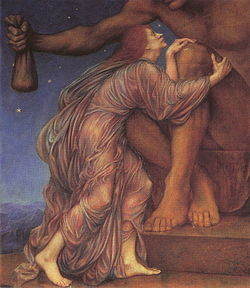- Matthew 6:24
-
 1909 painting The Worship of Mammon by Evelyn De Morgan.
1909 painting The Worship of Mammon by Evelyn De Morgan.
Matthew 6:24 is the twenty-fourth verse of the sixth chapter of the Gospel of Matthew in the New Testament and is part of the Sermon on the Mount.
In the King James Version of the Bible the text reads:
- No man can serve two masters: for either he
- will hate the one, and love the other; or else
- he will hold to the one, and despise the other.
- Ye cannot serve God and mammon.
The World English Bible translates the passage as:
- “No one can serve two masters, for either he
- will hate the one and love the other; or else
- he will be devoted to one and despise the
- other. You can’t serve both God and Mammon.
For a collection of other versions see BibRef Matthew 6:24
This famous verse continues the discussion of wealth, and makes explicit what was implied in Matthew 6:21: a person cannot pursue both material goods and spiritual well being. The two goals are mutually exclusive.
This famous saying also appears at Luke 16:13, but there it comes at the end of the Parable of the Unjust Steward. In Luke the saying is thus clearly one about God and money. In Matthew the previous verses imply it can mean placing anything above God. The word mammon was a standard one for money or possessions, and in the literature of the period it is generally not a pejorative term. Frequently Jews were called upon to honour God with their mammon, by making donations. Some other texts, such as 1 Enoch, do use the pursuit of mammon as a negative contrast to the pursuit of holiness. Traditionally it was believed that Mammon was the name of a pagan god who was synonymous with greed, but there is no evidence that a god by this name was ever worshipped and it is uncertain how this word entered the lexicon. Despite this the word is still frequently left untranslated as though it were a personal name. The character of Mammon also appears in the works of Milton.
Morris notes that the word serve is literally be a slave to, unlike in Luke where the reference is to servants.[1] Hill notes that while labourers would frequently have more than one employer, it was impossible for a slave to have two masters and the author Matthew may have chosen the slave metaphor as the clearer one.[2] However, Morris notes that Acts 16:16 mentions a slave with more than one master. What Jesus is noting is not a legal impossibility, but a psychological one. While the slave might at first believe he can serve both master's equally eventually he will come to prefer one over the other. The slavery metaphor also can mitigate Jesus' warning. One cannot be a slave to both God and money, but it does not mean that one cannot be both a slave to God and also pursue a reasonable interest in money. This verse is not a call for the renunciation of all wealth, merely a warning against the idolization of the pursuit of money.[3]
Matthew 6:24 also parallels part of Saying 47 of the noncanonical Gospel of Thomas.
References
Gospel of Matthew Preceded by:
Matthew 6:23Chapter 6 Followed by:
Matthew 6:25Categories:- Gospel of Matthew verses
- Sermon on the Mount
Wikimedia Foundation. 2010.
